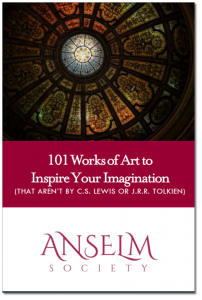EPISODE SUMMARY:
As we consider God’s world—the sun or the moon, the chicken or the egg, the laws of mathematics or the laws of physics—there is a feeling that rises within us. In addition to being moved to wonder as we consider the world, there is something else that moves us—our feelings, our emotions. But this raises an important question: What are the emotions and how do they function in these moments? In season 4 episode 2 of the Eudo Podcast, Courtney and Paul will discuss this question.
EPISODE NOTES:
The Master Argument of Lewis’s Abolition of Man [1]
Overall Thesis: Subjectivism is dangerous for human society, ultimately leading to its destruction.
- (Chapter 1 “Men Without Chests”): Since our emotions are our primary means of apprehending objective value (aesthetic, moral, and epistemic), undermining a person’s trust in their emotional perception of value (rendering them “Men without Chests”) leads to…
- (Chapter 2 “The Tao”): Moral Skepticism (and the rejection of belief in objective moral values), which in turn leads to…
- (Chapter 3 “The Abolition of Man”): The unbridled quest to conquer and manipulate Nature via technology (including human nature) by a small class of powerful individuals (“the Conditioners”) and the destruction of human society.
The Case for Objective Moral Values
The Two-Step Argument:
Step #1: Values exist; there is a moral landscape (i.e., moral nihilism is false). To show that values exist, we first make a distinction between two kinds of values: values rooted in personal preference and values rooted in the natures of things themselves. The question at this stage is not whether there are objective values in addition to subjective values, rather the question at this stage is whether there are any values at all of either kind. Here is an argument to show that there are at least some kinds of values, namely, values of preference:
- The argument from desires – Humans are desiring animals; we are creatures on a quest for objects we perceive as good; as valuable. Since we desire things, and to desire things is to desire things we perceive as valuable, it follows that there is a moral landscape. [NB: here is the principle at work in this argument = “to desire x is to perceive the goodness (i.e., the positive value) of x.”]
Step #2: Some of the values within the moral landscape are objective; i.e., not all values are values of preference (i.e., moral subjectivism is false). There are two arguments to establish step #2: the direct awareness of objective value [2], and the argument from the failure of moral subjectivism.
The Relationship between Emotions and Reason
Subjectivism = moral (or aesthetic) judgements and emotions are not about objective moral (or aesthetic) values; rather they are reports about the subjective emotions of the speaker.
According to subjectivism, emotions are not only unimportant, they are also irrational. They are “mere sentiments.” Lewis rejects this view of the emotions. For Lewis, emotions are “perception-like experiences of objective value” that can be in harmony or disharmony with reason:
Until quite modern times all teachers and even all men believed the universe to be such that certain emotional reactions on our part could be either congruous or incongruous to it—believed, in fact, that objects did not merely receive, but could merit, our approval or disapproval, our reverence or our contempt [3].
Emotions are our primary means (but not our only means, to be discussed shortly) of apprehending objective value in the world. We perceive objective value through the emotions. And when our emotions are formed properly (through moral education), “they enable direct awareness, and hence, knowledge of objective value” [4]. As Lewis states:
[Our] emotional states can be in harmony with reason (when we feel liking for what ought to be approved) or out of harmony with reason (when we perceive that liking is due but cannot feel it… [emotions] can be reasonable or unreasonable as they conform to Reason or fail to conform [5].
So, for Lewis, the faculty of emotion is a quasi-perceptual faculty that enables us to perceive objective value in the world.
Two Problems with Subjectivism:
- If subjectivism is true, we are infallible. We cannot be wrong, since we are simply reporting our own subjective states. This contradicts the plain fact that we are often mistaken about things, including things related to value.
- If subjectivism is true, moral disagreements are pointless. We think that we are genuinely debating morality, but if subjectivism is true, this cannot be the case. Everyone is correct, including those who think subjectivism is wrong!
The conclusion of our two-step argument: There are objective moral values.
How Can We Know Objective Values? The Epistemology of Objective Values.
We know values through the use of “emotional reasoning.” To better understanding what emotional reasoning is, consider the following two theses, both found in Lewis:
Moral Foundation Thesis = there are some fundamental moral truths (i.e., the Tao) that we can believe rationally and know without appeal to an argument or inference from more basic facts.
The Objectivity of Emotions Thesis = emotions are rational experiences, the perception of objective values in the world.
CONCLUDING REMARKS:
Without trained emotions, we lose our ability to correctly discern objective values in the world, values that unaided reason is often unable to recognize or appreciate or know deeply without the emotions. Thus, to truly see and delight in the world as Jesus does, to gain wisdom we must cultivate the emotions. How can we train the emotions to be truth apt?
First, enter into the suffering of others (or attend to your own pain and grief). When we enter into the suffering of others, we learn sympathy and compassion. We see the horrendous nature of suffering and we “feel” the wrongness of these states of affairs.
Second, learning from virtuous emotional exemplars. Such exemplars can help us train our emotions by inviting us into a way of life “characterized by virtuous emotional sensitivities to the complex values in the world” [6]. We can do this through literature, movies, stories, experiences, horror, joy, beauty, engaging lectures, and more (psychologists have noted the phenomenon of “emotional contagion” were we can “catch” the emotions of those around us).
Third, learning to see the world as Jesus does (which will lead to us delighting in the world as Jesus does). How did Jesus see the world? He saw it as God-bathed and God-infused. He saw it as gift, as sacred.
For a the free e-book from our season 4 sponsor, click this link: “101 Works of Art to Inspire Your Imagination (That Aren’t by C. S. Lewis or J. R. R. Tolkien)”


RESOURCES MENTIONED:
- Chesterton, G.K. The Everlasting Man. San Francisco, CA: Ignatius Press, 2008.
- Lewis, C. S. Miracles. New York, NY: Touchstone, 1996.
- ______. The Abolition of Man. New York, NY: HarperCollins, 2001.
- Meilaender, Gilbert. “On Moral Knowledge,” in The Cambridge Companion to C. S. Lewis, eds. Robert MacSwain and Michael Ward. Cambridge: Cambridge University Press, 2010.
- Pelser, Adam C. “Irrigating Deserts: Thinking with C. S. Lewis about Educating for Emotional Formation,” Christian Scholars Review 1 (2014): 27–43.
- Rasmussen, Joshua. How Reason Can Lead to God. Downers Grove, IL: InterVarsity, 2019.
[1] As Summarized by Adam C. Pelser, “Irrigating Deserts,” 27–43.
[2] Joshua Rasmussen, How Reason Can Lead to God, 138-140.
[3] C.S. Lewis, The Abolition of Man, 14–15.
[4] Ibid., 32.
[5] Ibid., 19.
[6] Pelser, “Irrigating Deserts,” 40.





